The message router#
The message router is Jasmin’s decision making component for routing every type of exchanged message through the gateway:
MO Messages (deliver_sm)
MT Messages (submit_sm)
The router is provisioned through:
Perspective broker interface (python programmatic API)
jCli modules: MO router manager and MT router manager
Each time a message is requiring a route decision the following process is executed:
Process flow#
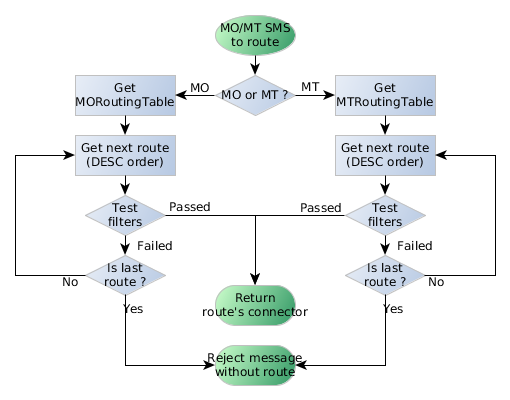
Routing process flow#
There’s one MORoutingTable and one MTRoutingTable objects holding respective routes for each direction (MT or MO), these are Route objects that hold one or many Filter (s) objects and one destination Connector (or many connectors in some specific cases, c.f. Multiple connectors).
As explained by the above routing process flow figure, for each message and depending on its direction, a routing table is loaded and an iterative testing is run in order to select a final destination connector or to reject (returning no connector) it, routes are selected in descendant order, and their respective filter objects are tested against the Routable object (It is an extension of the low-level SMPP PDU object representing a message, more information in Routable).
Examples#
MO Routing#
Having the below MO routing table set through a jCli console session:
jcli : morouter -l
#MO Route order Type Connector ID(s) Filter(s)
#30 StaticMORoute http_3 <DestinationAddrFilter (dst_addr=^\+33\d+)>
#20 RandomRoundrobinMORoute http_1, http_2 <DateIntervalFilter (2015-06-01,2015-08-31)>, <TimeIntervalFilter (08:00:00,18:00:00)>
#0 DefaultRoute http_def
Total MO Routes: 3
The following routing cases are considered:
MO message is routed to http_3 if:
Its destination address matches the regular expression “^+33d+”
MO message is routed to http_1 OR http_2 if:
Its received in summer months (June, July and August) of year 2015 and in working hours interval (8pm to 6am)
MO message is routed to http_def if:
None of the above routes are matched (fallback / default route)
MT Routing#
Having the below MT routing table set through a jCli console session:
jcli : mtrouter -l
#MT Route order Type Rate Connector ID(s) Filter(s)
#100 RandomRoundrobinMTRoute 0.00 smpp_1, smpp_2 <DestinationAddrFilter (dst_addr=^\+33\d+)>
#91 StaticMTRoute 0.00 smpp_4 <GroupFilter (gid=G2)>, <TimeIntervalFilter (08:00:00,18:00:00)>
#90 StaticMTRoute 0.00 smpp_3 <GroupFilter (gid=G2)>
Total MT Routes: 3
The following routing cases are considered:
MT message is routed to smpp_1 OR smpp_2 if:
Its destination address matches the regular expression “^+33d+”
MT message is routed to smpp_4 if:
Its sent by a user in group G2 and in working hours interval (8pm to 6am)
MT message is routed to smpp_3 if:
Its sent by a user in group G2
Note
The route order is very important: if we swap last both routes (#90 and #91) we will run into a shadowing route where all MT messages sent by a user in group G2 will be routed to smpp_3, no matter what time of the day it is.
Note
In this example, there’s no DefaultRoute, this will lead to message rejection if none of the configured routes are matched.
Note
Route’s rate are discussed in Billing.
Router components#
The router components are mainly python objects having the unique responsibility of routing messages to Jasmin connectors.
Routable#
The Routable class is extended by child classes to hold necessary information about the message to be routed.
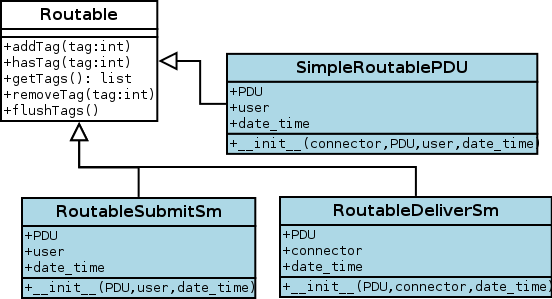
jasmin.routing.Routables.*#
The SimpleRoutablePDU is only used for Jasmin unit testing, RoutableSubmitSm and RoutableDeliverSm are used depending on the message direction:
MO: RoutableDeliverSm
MT: RoutableSubmitSm
All routables provide a tagging api through the addTag(), hasTag(), getTags(), removeTag(), flushTags() methods, this feature is mainly used in the interceptor, there’s a concrete example of such usage here.
Attribute |
Type |
Description |
|---|---|---|
PDU |
smpp.pdu.pdu_types.PDURequest |
The SMPP submit_sm PDU |
user |
jasmin.routing.jasminApi.User |
Jasmin user sending the message |
date_time |
datetime.datetime |
Date & time of message send request |
Attribute |
Type |
Description |
|---|---|---|
PDU |
smpp.pdu.pdu_types.PDURequest |
The SMPP deliver_sm PDU |
connector |
jasmin.routing.jasminApi.Connector |
Jasmin origin connector of the message |
date_time |
datetime.datetime |
Date & time of message reception |
Connector#
The Connector class is extended by child classes to represent concrete HTTP or SMPP Client connectors.
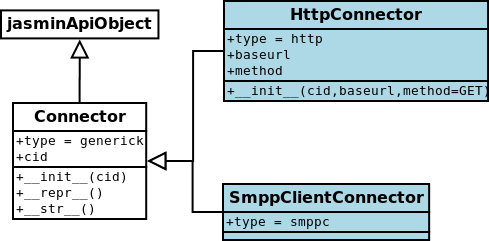
jasmin.routing.jasminApi.Connector and childs#
Filter#
The Filter class is extended by child classes to define specific filters which are run by Jasmin router to match a desired Routable, every filter have a public match(routable) method returning a boolean value (True if the filter matches the given Routable).
As explained, filters provide an advanced and customizable method to match for routables and decide which route to consider, the figure below shows the Filter implementations provided by Jasmin, you can extend the Filter class and build a new filter of your own.
The usedFor attribute indicates the filter-route compatibility, as some filters are not suitable for both MO and MT routes like the examples below:
UserFilter and GroupFilter: MO Messages are not identified by a user or a group, they are received through a connector
ConnectorFilter: MT Messages are not coming from a connector, they are sent by a known user/group.
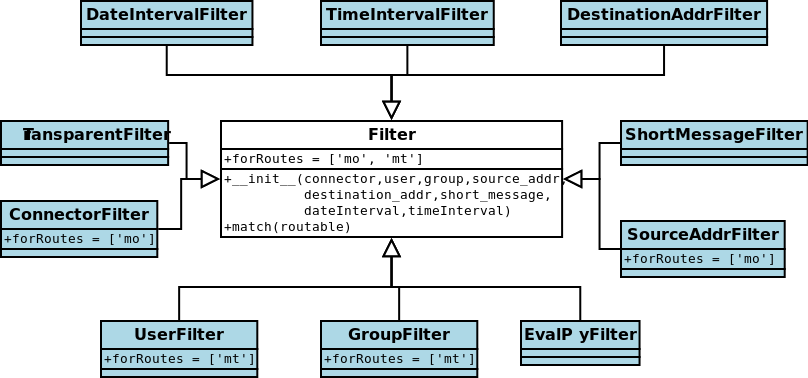
jasmin.routing.Filters.*#
Route#
A Route class holds one or many filters, the matchFilters(routable) method is called to match the given routable against every filter of the Route (using AND operation when there’s many filters), if the matching succeed, the Jamsin router will ask for the Connector to consider by calling getConnector() method which will return back the Route ‘s connector.
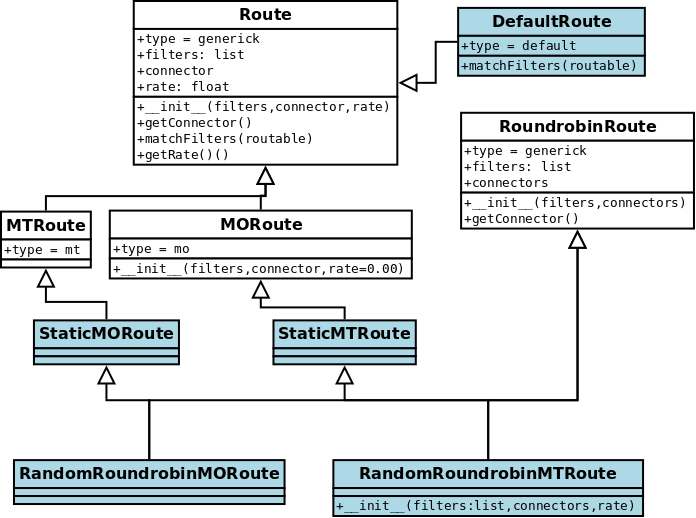
jasmin.routing.Routes.*#
Static and default routes are the simplest implemented routes, the difference between them is:
DefaultRoute ‘s matchFilter() method will always return True, it is usually a fallback route matching any Routable
StaticMORoute and StaticMTRoute will return one Connector after matching the filters with matchFilters(routable) method
There’s a lot of things you can do by extending the Route class, here’s a bunch of possibilities:
Best quality routing: Implement a connector scoring system to always return the best quality route for a given message
Multiple connectors#
When extending Route class, it is possible to customize the behavior of the route and that’s what RoundrobinMORoute and RoundrobinMTRoute do, they are initially provisioned with a set of connectors, and the getConnector() method is overloaded to return a random connector from it; this can be a basic usage of a load balancer route.
The newly added (Jasmin 0.9b10+) has new FailoverMORoute and FailoverMTRoute routes, they are also extending the Route class to provide failover on top of multiple connectors.
RoutingTable#
The RoutingTable class is extended by destination-specific child classes (MO or MT), each class provide a Route provisioning api:
add(route, order): Will add a new route at a given order, will replace an older route having the same order
remove(order): Will remove the route at the given order
getAll(): Will return all the provisioned routes
flush(): Will remove all provisioned routes
The getRouteFor(routable) will get the right route to consider for a given routable, this method will iterate through all the provisioned routes in descendant order to call their respective matchFilters(routable) method.
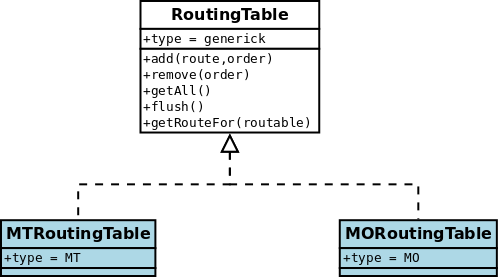
jasmin.routing.RoutingTables.*#